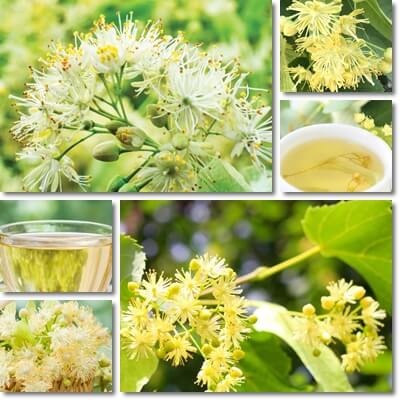Linden flower tea is one of the best tasting herbal teas, and you can drink it every single day unless you are allergic to linden or pregnant. Linden flower tea is good for respiratory infections as it helps calm cough and lower fever. The herbal infusion is diuretic, with blood pressure lowering effects and benefits for kidney function. Linden flower tea stimulates the immune system, lowers anxiety and exerts hepatoprotective and sedative properties, among other health benefits.
What is linden flower tea?
As the name indicates, linden flower tea is a herbal tea made from the fresh or dried flowers of trees in the genus Tilia. There are dozens of different species of linden, but the most common are the large-leaved linden (Tilia platyphyllos) and the small-leaved linden or little-leaf linden (Tilia cordata), both native to Europe, the silver linden (Tilia tomentosa), native to southeastern Europe through southwestern Asia, and the American linden (Tilia americana), native to North America.

What does linden flower tea look like?
Linden flower tea color ranges from clear to pale yellow, light greenish yellow, deep golden yellow and orange. Tea color is determined by the concentration of the herbal infusion (linden flower material per cup of tea), species of linden flowers used, type of linden flower tea (just linden flowers, or flowers and leaves), steeping time and degree of processing (fresh vs dried flowers). For example, fresh flowers produce a lighter colored tea with a greenish tinge, whereas dried flowers produce a more yellow tea.
Older, dried linden flowers can cause the tea to turn an orange color if steeped for long enough. Similarly, linden flower tea with added leaf material can yield orangey tones. As a general rule, the more concentrated the tea and the longer the flowers are infused, the darker the color. Conversely, the less flowers per cup and the less they are infused, the lighter the tea color.
What does linden flower tea taste like?
The taste of linden flower tea is decidedly sweet, but mild in intensity, with a moderate to strong sweet floral perfume. The aroma that completes the flavor profile is owed to organic volatile and aromatic oils present naturally in the flowers. Unless you are allergic to honey, you can also sweeten the tea with raw linden honey and enjoy additional benefits for health, including natural antibacterial effects and an immune system stimulating action.

Linden flower tea nutrition
Linden tea is consumed primarily for its benefits derived from biologically active compounds such as aromatic volatile oils, pollen particles, nectar particles and antioxidant polyphenols e.g. oleanolic acid, maslinic acid, apigenin, luteolin, kaempferol, quercetin, kaempferol-3-O-glucoside, quercetin-3-O-glucoside, rutin, tiliroside, ellagic acid, shikimic acid and quinic acid (study).
Linden flowers and linden flower tea have only trace amounts of some essential nutrients such as B vitamins, vitamin C, dietary minerals such as iron, manganese, zinc, copper, chromium and more, but overall insufficient to produce any measurable benefits for health.
What is linden flower tea good for?
Stimulates immunity
Linden flower tea stimulates the immune system and it does so via bioactive pollen particles which trigger an immune system response. According to research, pollen contains numerous factors that can stimulate an innate immune response, including intrinsic factors such as nicotinamide adenine dinucleotide phosphate oxidases, proteases, aqueous pollen proteins, lipids, and antigens.
Pollen particles increase antigen uptake, modulate the cell function of dendritic cells which are immune system cells, among others, inducing clear immunological effects (study). Immune system modulation by pollen particles is well tolerated, with the exception of instances of allergy to specific pollens. Even in honeybees, research shows that pollen particles, and nectar. stimulate immunity to viral infections (study).
Moreover, polysaccharide complexes isolated from the flowers of silver linden (Tilia tomentosa) exhibited immunomodulating effects. More exactly, the polysaccharide complexes showed ex vivo intestinal immunomodulating activity, stimulating Peyer’s patch immune cells through innate and adaptive mechanisms (study).
Sedative properties, good for insomnia
Linden flower tea is naturally caffeine-free and exhibits mild sedative properties, exerting a calming effect that is conducive to restful sleep. Drinking a warm cup of linden flower tea in the evening can potentially help induce sleep faster and maintain sleep for longer, helping combat insomnia. Also see the benefits of cherries and cherry juice for sleep.
Anti-anxiety action
Evidence-based reports show herbal teas that are naturally caffeine-free have an anxiolytic action, helping reduce anxiety levels and prevent anxiety attacks in people with anxiety disorder. Linden flower tea is one option and responsible for the anti-anxiety effects are bioactive compounds transferred from the flowers to the tea which inhibit excitability at the level of the central nervous system (study).
Magnesium supplements are another great solution for reducing anxiety, a dose of 300 mg, 350 mg or 400 mg of magnesium effectively lowering anxiety levels and inducing calm.
See which magnesium form to choose.
Helps calm cough and sore throat
Linden flowers contain sticky nectar and mucilage, essentially viscous, water-soluble polysaccharides, as well as antioxidants such as flavonoids and pollen with immune system modulating activities. While the sticky polysaccharides in the flowers help contain and reduce sore throat irritation and inflammation and combat cough, antioxidants and pollen activate the immune system response against the infection.
Good for lowering fever
Drinking linden tea induces perspiration which helps bring down fever. Linden tea has additional benefits, proving biologically active pollen particles that stimulate the immune system and trigger an immune system response that clears out infection.
Good for colic and digestive upset
Linden flower tea has antispasmodic properties and a sedative action, and actively combats colic, stomach cramps associated with indigestion and general digestive upset. Additionally, mucilaginous compounds in the flowers and tea help soothe the digestive tract, providing relief from upset related to indigestion, acid reflux, heartburn.
Hepatoprotective properties
Drinking linden tea regularly confers hepatoprotective benefits, essentially protecting the liver from damage. Studies show a flavonol glycoside in linden flowers and linden flower tea, called tiliroside, actively protects liver cells from injury (study).
Blood sugar lowering effects
Small-leaved linden (Tilia cordata) is used in traditional medicine for the treatment of high blood sugar in diabetes, and other plants of the same family have shown hypoglycemic activity in animal models and diabetic patients. Extracts of American linden (Tilia americana) in particular were shown to have measurable hypoglycemic activity on diabetic rats, attributed to the presence of flavonoid antioxidants and alkaloids (study). It can be inferred from available research that linden flower tea can also exert some degree of hypoglycemic activity which could recommend it for use for blood sugar control.
Diuretic effects, good for kidney health
Linden flower tea is diuretic which means it helps increase urine output which helps support normal kidney function and maintain kidney health. As a diuretic, the tea also helps maintain the electrolyte balance in the blood and combats water retention that causes swelling and puffiness.
Minor benefits for high blood pressure
Drinking linden flower tea helps lower blood pressure numbers via several mechanisms. For one, the tea has diuretic properties and encourages the elimination of urine and, along with it, also excess sodium, a main cause for high blood pressure. Linden flower tea also acts as a depressant on the nervous system and exerts sedative properties, inducing calm and promoting relaxation conducive to lower blood pressure numbers.
Lastly, the bioactive flavonoid from linden, tiliroside, has been shown to exert antihypertensive benefits by modulating calcium channels and inducing vasorelaxation and vasodilation (study).
Good for headaches and migraines
Drinking linden flower tea can help relieve headaches and migraines via antihypertensive, sedative and anxiolytic activities. The herbal tea induces blood vessel relaxation and dilation, and actively combats hypertension which is a leading cause of headaches and migraines.
Furthermore, it exerts a depressing effect on the nervous system which reduces agitation and stress and induces calm. Lastly, flavonoids and other biologically active compounds in linden tea exert anti-anxiety effects which further contribute to combating headaches and migraines.
Linden flower tea side effects
Side effects: allergic reactions
Linden has a significant allergenic potential and can cause allergic reactions that can culminate with anaphylactic shock which is a medical emergency. Anyone with allergies to linden pollen should avoid linden flower tea, as well as linden leaf tea. If you experience a rash (itching, redness, bumps), difficulty breathing with hoarseness, wheezing and laryngospasms, coughing or swelling of the lips, tongue or closing of the airways, seek medical help immediately.
Risk of botulism
Contraindications for linden tea: babies and small children. It’s not unusual for babies and small children to be offered herbal teas such as linden flower tea to soothe colic or other digestive upset, calm crying, or to supplement milk intake for hydration purposes. However, there is research that suggests linden, and preparations from it, are a potential vehicle of Clostridium botulinum spores and can potentially be a source of transmission of infant botulism (sourced from this study).
Contraindications: pregnancy
Herbal teas carry certain risks for pregnant women. Linden tea is contraindicated in pregnancy because of its potential to cause a miscarriage. Risks are the same for both linden tea and other common herbal teas. It’s strongly recommended to talk to your doctor first if you are pregnant and want to drink linden tea.
